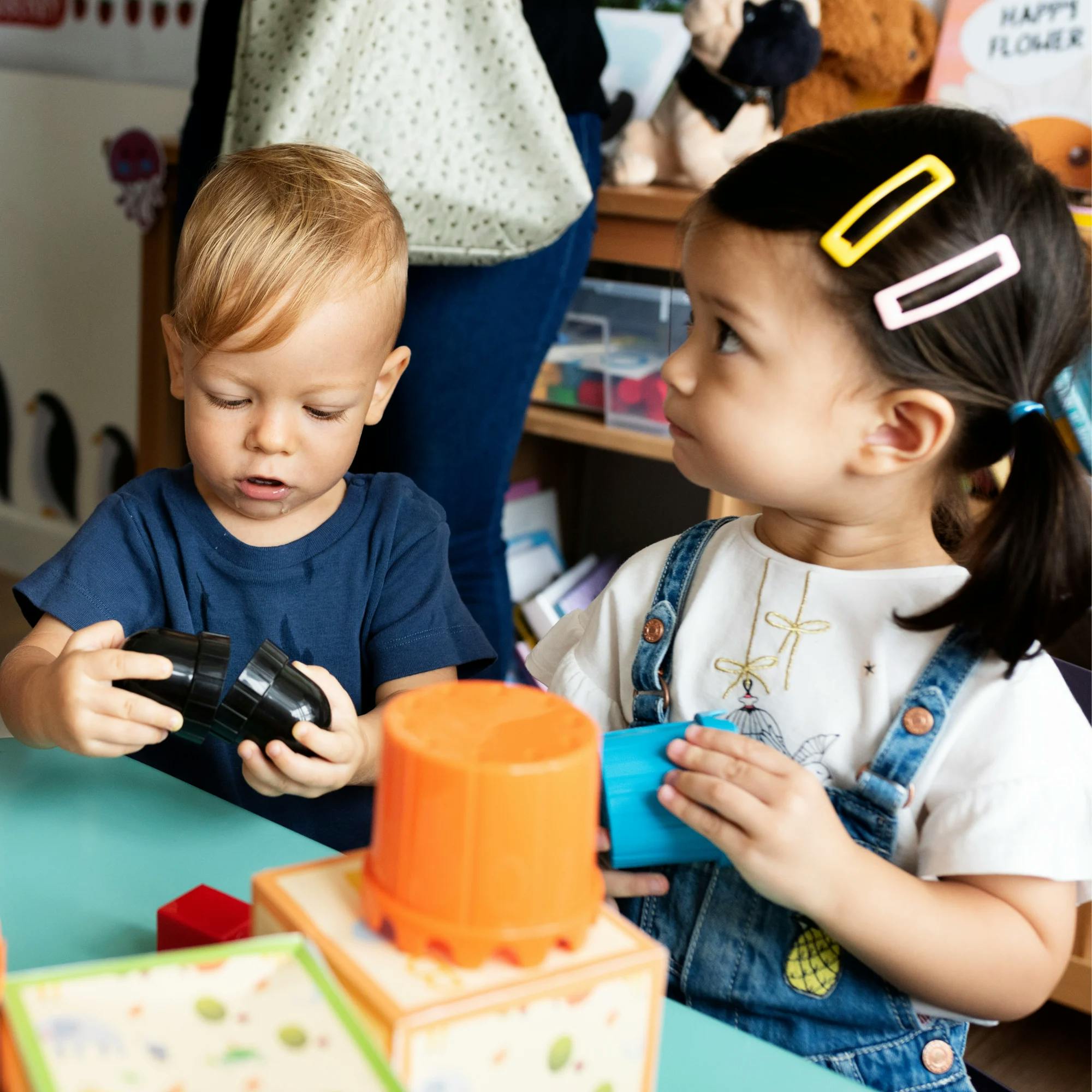If your child isn’t talking yet, you might feel a bit worried. Are they on track or falling behind? Are they simply a late bloomer? Every child develops at their own pace, so answering this question can be tough.
However, there are general milestones that speech therapists watch for in order to determine whether a speech or language delay is present. Here at Expressable, our speech therapists know that the sooner a child can start getting the support they need, the better.
Read on to learn more about what a speech delay is, at what age a child is considered speech delayed, and how to know if you should contact a speech therapist for your child.
Could your child have a speech delay?
Take our screenerWhat age is considered speech delayed?
A speech delay is when a child does not meet the typical milestones for speech and language development at their age. Speech delays can happen for a number of reasons, including a lack of verbal stimulation at home, hearing loss, or a developmental disorder.
A child can be considered speech delayed at any age if they are not meeting the typical developmental milestones for their age. For example, babies can begin showing the signs of a speech delay as early as 6 months old. At this age, infants typically babble and combine vowels and consonants, like “ga-ga-ga.” If a baby isn’t making these types of noises, it can point to a speech delay.
For toddlers, you may be able to identify the signs of “late talking” around 15 months. If they haven’t said their first words by then, children at this age could be considered speech delayed.


If you think your child might have a speech delay, the American Speech-Language-Hearing Association (ASHA) has outlined some common developmental milestones to keep in mind:
Infant speech milestones include cooing, crying, and responding to sounds. By 3 months, you may hear some simple sounds like "goo," and "ah."
By 6 months, babies usually begin to babble longer strings of consonant-vowel combinations, such as "ba-ba-ba" or "da-da-da.”
From 12-24 months, children usually begin to say “no” and start building their vocabulary. They tend to use at least 5 to 10 words regularly, like saying “milk” if they’re thirsty.
Around 2 years old, children can start combining words to form simple two-word phrases. They might also begin to use pronouns (such as me, my, and mine).
By age 3, a toddler’s vocabulary typically expands to 200 to 300 words. They can form short sentences of 3 to 4 words.
By age 4, children are usually able to carry on basic conversations with both their family and unfamiliar individuals. They can also use more complex sentences.


Another part of speech development to look at is how easily your child's speech is understood by others. Experts state that 50% of a child’s speech should be understood by age 2, 75% by age 3, and 90% by age 4. This applies to familiar listeners–people like family members who hear a child’s speech every day. But what about unfamiliar listeners, who don’t often interact with your child?
Ideally, we want anyone to understand at least 50% of what a child says by the time they’re 4 years old.
By age 5, we’d look for them to be 75% understood.
By age 7, they should be 90% understood by anyone they speak to.
If a child's speech is difficult to understand for their age, this is a sign that they may need help with their speech sound production.


When should you worry if your child isn’t talking?
Children can experience language problems from infancy to middle school. But at what age is a speech delay concerning?
Generally, if your child isn’t responding to sounds or making noises by 6 to 9 months, or hasn’t said their first word by 15 months, it makes sense to talk with your pediatrician or a speech-language pathologist (also called a speech therapist). While your child might just be on their own timeline, they may also have a developmental disorder that needs treatment.
Victoria Zilbergleyt, M.A., CCC-SLP, is a licensed speech therapist at Expressable. As she explains, "A speech delay doesn’t always mean a long-term issue, but waiting to see if your child 'catches up' can lead to missed opportunities for support. Early speech therapy can help build strong communication skills before challenges become more impactful. It ensures the child is set up for success in the next stages of development."
If your child isn’t responding to sounds or making noises by 6 to 9 months, or hasn’t said their first word by 15 months, it makes sense to talk with a professional.
Studies show that the earlier a child starts speech therapy, the better the outcomes. So if you’re worried that your child isn’t talking, it’s always a good idea to seek support sooner rather than later.
Remember, you have lots of support available! As Expressable speech therapist Meghan Niemeyer, CScD, CCC-SLP, says, "Caregivers know their child best. If you have a concern, don't hesitate to reach out to a speech-language pathologist. As a mother myself, I know the anxiety that can be felt when your child may or may not be meeting milestones. Just know you're doing the best thing for your child by keeping an eye on it and reaching out for help, if needed."

Should I get a speech evaluation for my child?
So what's the first step if you’re worried that your child isn’t talking? A speech evaluation is a great place to start. A licensed speech therapist can assess your child’s language development and create a treatment plan for helping them reach their full potential. An evaluation is also a good idea if you’ve noticed any other red flags, such as difficulty understanding instructions or trouble pronouncing words correctly.
The truth is, while some kids do catch up on their own, others need support—and we won’t know which category your child falls into until we take action.
It can be tempting to think, "We'll just wait and see." This is one of the most common reasons we hear from families who don't move forward with therapy. As Carly Adam, M.S., CCC-SLP, TSSLD, explains, "I often hear parents say, ‘But my child will just catch up!’ or ‘Let’s just wait and see what happens.’ The truth is, while some kids do catch up on their own, others need support—and we won’t know which category your child falls into until we take action. It’s always better to check and intervene early rather than wait and see.”
Marina McKeown, M. Ed., CCC-SLP, agrees. She says, "We can’t get back time! So if we can be proactive in assessing our children for speech-language concerns, that means we can begin to support a need should it arise, before waiting for that delay to become more and more significant with time passing."


Speech therapy works for even the youngest kids. Speech therapists make sure that therapy sessions are play-based and fun! It's all part of the art of helping children with such an important part of their development. Seham Siddiqui, M.S., CCC-SLP, puts it this way: “After 10+ years of being an SLP, I have found that the key to communicative progress is dependent on how meaningful speech therapy is to the child. If you see us having too much fun, you know we’re doing it right!"
How to find a speech therapist
It's never too soon—or too late—to get your child the support and resources they need to become a confident communicator.
If you’re ready to find a qualified speech therapist for your child, Expressable can help. We'll match you with one of our licensed speech therapists based on your needs, location, and availability (including evenings and weekends). Get started here!
How Expressable Can Help
Concerned your child isn't reaching age-expected milestones? Looking for communication support from a professional? Expressable is a national online speech therapy practice serving children and adults. We treat all major areas of communication and feeding, offer flexible hours including evenings and weekends, and accept most major health insurance plans. We’re proud to have earned more than 3,000 5-star reviews from our clients (4.9/5 average).
Our therapy model is centered on parent and caregiver involvement. Research proves that empowering caregivers to participate in their loved one’s therapy leads to better outcomes. That’s why we combine live, 1-on-1 speech therapy with personalized education and home practice activities for faster progress.
Communication is more than words. It’s how we share how we feel and show who we are. We’re here to help you or your child do just that.

 Leanne Sherred, M.S., CCC-SLP
Leanne Sherred, M.S., CCC-SLP










